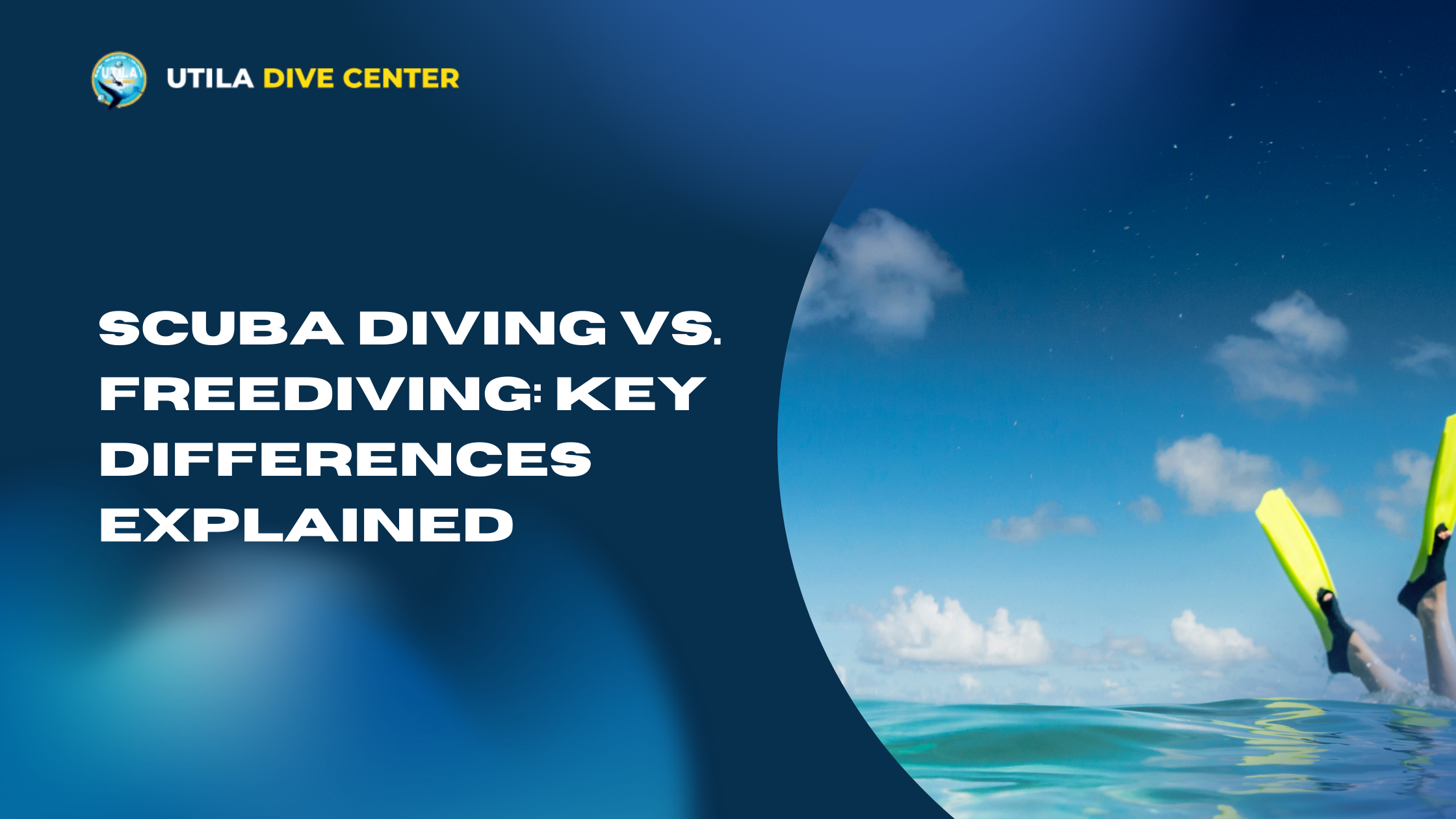
Scuba Diving vs. Freediving: Key Differences Explained
Scuba Diving vs. Freediving: Key Differences Explained
By: Manny Lagos | Date: 2025-04-24T06:09:35.489Z
Diving into the underwater world and witnessing its beauty first-hand is a one-of-a-kind experience, but deciding between the two amazing paths i.e. SCUBA diving vs Freediving is a bit tricky. Both offer unreal experiences, but they are definitely different in many ways. From the gear you need and the techniques you use to the skills involved, everything matters.
Understanding the difference between Freediving and SCUBA diving can help you make the right choice, no matter your experience level.
This page will take you through everything you need to know about Freediving vs SCUBA diving.
What is Free Diving?
Freediving is thought to be one of the purest forms of diving, where your body and mind are the only tools you need. Instead of using traditional diving equipment, divers just use their breath to dive deep beneath the waves. This kind of diving allows you to push past your limits and puts your lung capacity and breath-holding skills to test.
It is perfect for those who want a peaceful experience underwater without any extra baggage.
What is SCUBA Diving?
Self-Contained Underwater Breathing Apparatus, or SCUBA diving is a more equipment-intensive type of diving. It lets you dive deep and breathe comfortably in the ocean with the help of a regulator and a tank of compressed air. SCUBA diving gives you the freedom to explore the underwater world for much longer due to the consistent supply of air from their tanks.
If you’re craving longer, deeper underwater escapades, SCUBA diving is the way to go.
Core Differences Between SCUBA Diving and Freediving
Below, we’ll break down the six key differences between SCUBA diving vs Freediving to help you decide which one works for you the best.
Equipment and Techniques
Freediving:
- Minimal equipment:
In Freediving you usually just work with a dive mask, fins, snorkel, and maybe a wetsuit (if required). No heavy tanks or extra gadgets to drag around.
- Fluid movement:
Movement is super important in Freediving. Smooth, controlled movements go a long way and help you conserve energy and extend dive time.
- Breath-hold diving:
The focus here is on breath control and your ability to equalize as you descend into the water. The key is to breathe deeply and maintain a relaxed state of mind.
SCUBA Diving:
- Complete gear setup:
Unlike Freediving, SCUBA diving requires a lot more equipment to help you descend and ascend safely. You must have a regulator, a tank of compressed air, a BCD (buoyancy control device), a dive computer, and a wetsuit.
- Dive planning:
SCUBA diving involves a lot of careful planning. You’ll need to decide the dive time, and depths beforehand, especially if you’re going for longer dives.
- Air management:
For SCUBA divers, controlling buoyancy and air consumption is really important as it helps them maintain proper positioning in the water.
Training and Certification
Freediving:
Freediving courses are usually shorter, simpler, and more straightforward as compared to SCUBA diving. You majorly focus on perfecting breath control, equalization, and other essential safety skills. Many freediving courses (like those from AIDA) can be completed in just a few days, making it a popular option amongst people who want to start diving quickly.
The best part? You can easily move on to advanced Freediving courses, once you gain some experience and get a few freedives in.
SCUBA Diving:
When it comes to Freediving vs SCUBA diving, the latter requires more in-depth training to get started. The PADI Open Water Diver course is where it all begins. This course covers all the essential skills such as dive safety, and buoyancy control. It also teaches you how to use your gear properly. Once you have got the basics down and want to turn diving into a full-time career, you can opt for advanced certifications like Advanced Open Water Diver, Instructor, or Divemaster.
With Utila Dive Center on your side, you can take on specialised SCUBA diving courses as well.
Duration and Depth
Freediving:
When it comes to depth and duration, Freedivers usually stick closer to the surface and dive between 10-40 feet (3-12 meters). Experienced freedivers, on the other hand, can push well beyond that distance. But since they also rely solely on a single breath, their dives are usually short, lasting just a few minutes before the need to resurface arises.
SCUBA Diving:
SCUBA divers get to go deeper and stay longer underwater. With a regulator and a tank of compressed air, they can easily hit a depth of 10-40 meters and stay submerged for more than 30 minutes. The only catch? Air supply, dive planning, and underwater experience.
Physical Fitness Requirements
Freediving:
Freediving is all about efficiency, so having a strong core, good lung capacity, and strong cardiovascular health is an absolute must. Since you're required to hold your breath for extended periods during a freedive, training your lungs to use oxygen efficiently can make a huge difference. Moreover, being flexible in the water pays off as it helps you conserve energy, and makes the dives much more fun.
SCUBA Diving:
SCUBA diving doesn’t require the same level of breath control or muscle strength, but general health still matters. Carrying all that heavy equipment underwater, and managing buoyancy at the same time is not as easy as it sounds. So, being in good shape is super important for every diver.
Cost and Accessibility
Freediving:
Freediving is the more budget-friendly path to explore the ocean. With minimal gear and shorter training courses (no expensive air tanks required), it’s easy on the pocket. The best thing? You can freedive almost anywhere with clear, shallow waters– no need to stress about dive shops or expensive rentals.
SCUBA Diving:
If you think about Freedive vs SCUBA dive, then SCUBA dive requires a greater financial investment. Between regulators, air tank refills, buoyancy control devices (BCDs), wetsuits, dive shop rentals, and certifications, the costs can add up, really quickly.
Plus, SCUBA diving requires access to specific dive sites that can accommodate all that equipment, which means you can’t just dive in wherever you like.
Environmental Impact
Freediving:
Freediving is as eco-friendly as it gets. With no motor, tanks, or other mechanical equipment, freedivers move through the water easily and blend in with the marine life instead of disturbing it. It’s the best way to experience the underwater world the way sea creatures do.
SCUBA Diving:
SCUBA diving lets you experience marine life up close and opens the door to endless underwater opportunities. While still a low-impact activity, it does have a larger environmental footprint because of the tanks, regulators, and sometimes boats. But that doesn’t mean it can’t be done sustainably. Many divers are really passionate about ocean preservation. At Utila Dive Center, we practice responsible habits like using non-toxic sunscreens, avoiding contact with coral reefs, and maintaining good buoyancy to prevent disturbing the seabed.
SCUBA Diving Vs Freediving: Which Is Right for You?
Choosing between SCUBA diving vs Freediving ultimately comes down to the kind of experience you want.
Freediving is the right match for you if you like a minimalist approach– no mechanical equipment, just you and the water. It’s also ideal for those people who are comfortable with breath control techniques and want to form a raw, personal connection with the ocean.
SCUBA diving, on the other hand, is perfect for exploring deeper waters for longer durations. If you want to get close to the unique marine life at greater depths or want to pursue a career in diving, this should be your go-to.
At Utila Dive Centre, we provide expert training in both SCUBA and freediving. No matter which path you choose, you’ll get to experience Utila’s stunning underwater paradise in the best way possible.
But why pick just one when you can experience the magic of both in Utila?
That’s right. We offer custom packages that feature both freediving and SCUBA diving training programs. How great is that?
Don’t wait, contact us and go diving now!
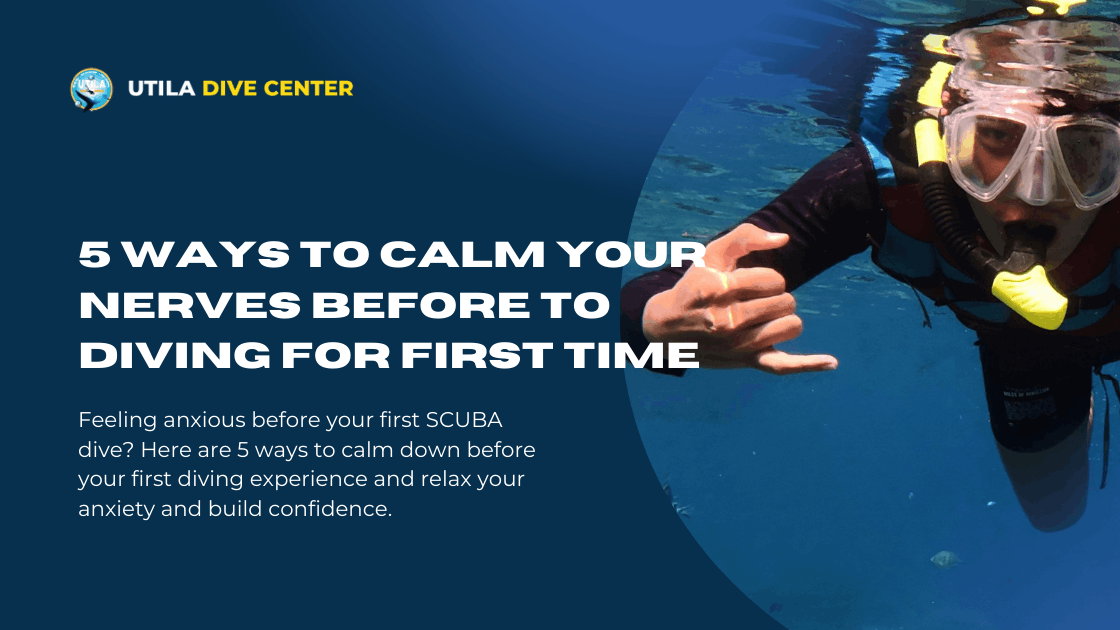
5 Ways to Calm Your Nerves Before to Diving for First Time
Feeling anxious before your first SCUBA dive? Here are 5 ways to calm down before your first diving experience and relax your anxiety and build confidence.
Read more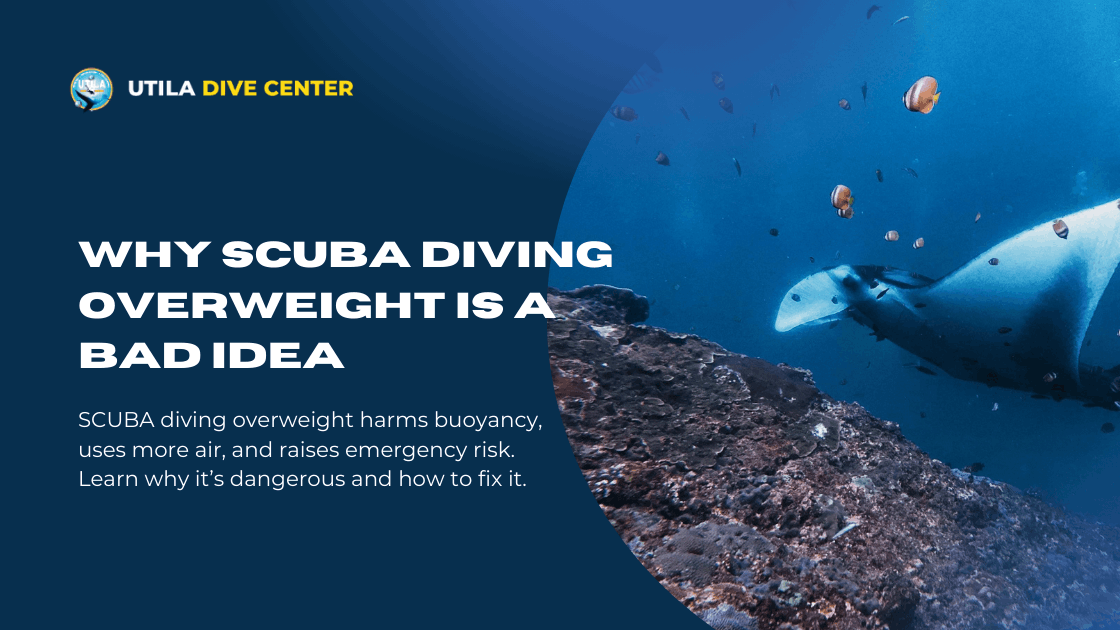
Why SCUBA Diving Overweight Is a Bad Idea
SCUBA diving overweight harms buoyancy, uses more air, and raises emergency risk. Learn why it’s dangerous and how to fix it.
Read more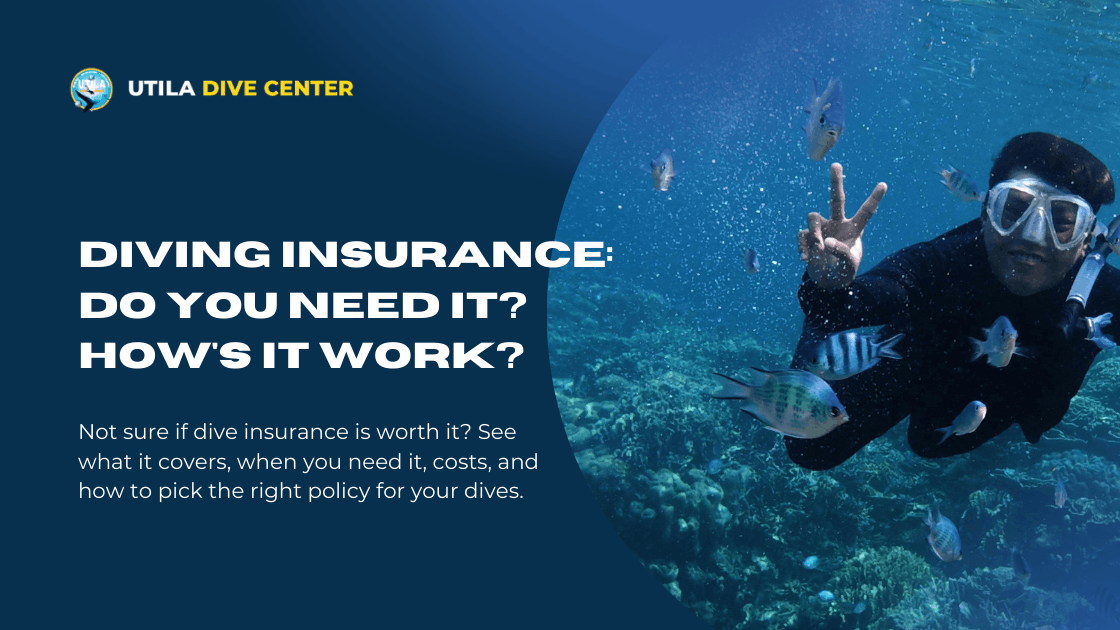
Diving Insurance: Do You Need It? How's It Work?
Not sure if dive insurance is worth it? See what it covers, when you need it, costs, and how to pick the right policy for your dives.
Read more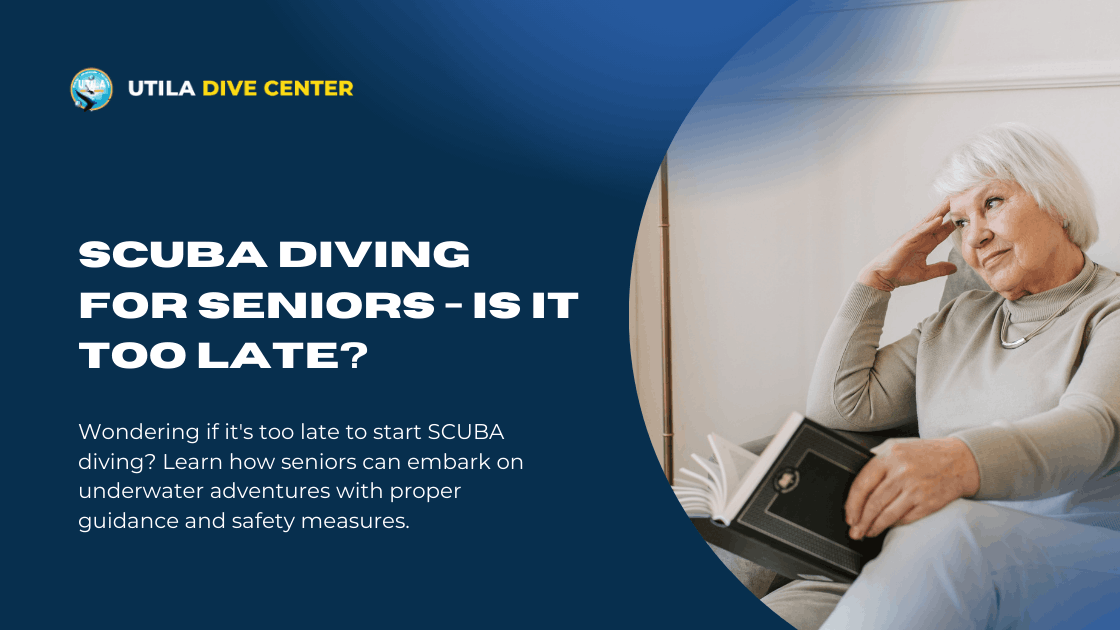
SCUBA Diving for Seniors - Is It Too Late?
Wondering if it's too late to start SCUBA diving? Learn how seniors can embark on underwater adventures with proper guidance and safety measures.
Read more